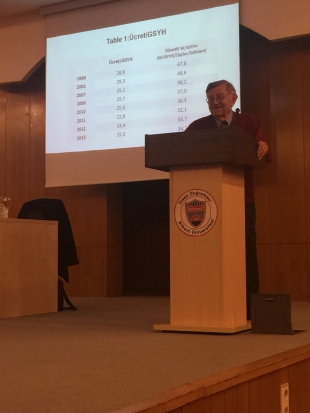
MONUMENT AT BILKENT: UNDERSTANDING CONTEMPORARY DYNAMICS OF TURKISH POLITICAL ECONOMY
GE 44X series, the flagship Transdiciplinary Senior Project courses at FEASS, hosted Prof. Korkut Boratav, a pioneer in political economy and economic history whose work has helped the world scholarly community as well as the interested public in general understand the Turkish political economy. The event was an intergenerational gathering, bringing together younger generations of economics, political science and international relations majors with a veteran of not only economics but also of all social sciences in Turkey.
After an introduction by Dean Yeldan, Prof. Boratav began by introducing various conceptual definitions of income distribution. As a scholar of political economy, he proposed to decompose national income based on class-based incomes. He shared empirical evidence on how incomes of different segments evolved in his native Turkey during the last four decades, emphasizing the impact of politics on economic outcomes. Prof. Boratav then shared evidence on the 2000s when incomes of working classes as well as farmers kept eroding in relative terms. Despite these developments, however, Turkey had not seen political change over this period, he added. The main reason for this stability, Boratav explained, was a host of compensatory transfer mechanisms. These mechanisms included sustained consumption patterns of masses which are supported by a credit boom made possible by the international context as well as expanding social expenditures by all levels of government. Prof. Boratav concluded his talk by arguing that this regime has been remaining stable so long as the electorate keeps focusing on their absolute, and hence not relative, gains from this regime.
After an introduction by Dean Yeldan, Prof. Boratav began by introducing various conceptual definitions of income distribution. As a scholar of political economy, he proposed to decompose national income based on class-based incomes. He shared empirical evidence on how incomes of different segments evolved in his native Turkey during the last four decades, emphasizing the impact of politics on economic outcomes. Prof. Boratav then shared evidence on the 2000s when incomes of working classes as well as farmers kept eroding in relative terms. Despite these developments, however, Turkey had not seen political change over this period, he added. The main reason for this stability, Boratav explained, was a host of compensatory transfer mechanisms. These mechanisms included sustained consumption patterns of masses which are supported by a credit boom made possible by the international context as well as expanding social expenditures by all levels of government. Prof. Boratav concluded his talk by arguing that this regime has been remaining stable so long as the electorate keeps focusing on their absolute, and hence not relative, gains from this regime.



